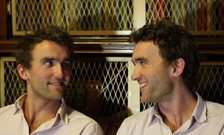Identical twins begin polar trek

Identical twins - Hugo and Ross Turner – will begin a unique expedition across the polar ice cap of Greenland this week, during which researchers at King's will study how modern clothes, food and equipment protect the body.
Ross Turner will utilise the same style of equipment and facilities famously used by Sir Ernest Shackleton 100 years ago in 1914, during the 'Endurance' expedition to Antarctica. Ross will therefore have an early 20th Century polar expedition diet and will be pulling a 1900s-style sled.
Hugo Turner will be making use of the most advanced technology and equipment available to today's explorers. Researchers from King's will monitor if and how Hugo benefits from advances in modern technology and nutrition, following base line tests to measure height, weight, body mass, blood pressure and bone density.
The 340-mile expedition, in aid of Spinal Research, is expected to take a month and will involve trekking over dangerous terrain, including the Nagtivit glacier, enduring sub-zero arctic temperatures, avoiding dangerous crevasses and surviving hazardous storms.
Dr Kirsten Ward from the Department of Twin Research and Genetic Epidemiology, said: 'Twins help us to look at the role of genes and environment in a range of common complex disease and their associated traits of interest. As Hugo and Ross are identical, and therefore share 100 per cent of their genes, any differences that we see between them will be due to the environment that they have been exposed to during their expedition. We are very excited to be able to take part in this unique opportunity to see how the different equipment impacts on them both during their time in Greenland.'
The twins' journey is also being followed by 'Intrepid Explorers', a group set up by three PhD students in the Department of Geography - Briony Turner, Kate Baker and Faith Taylor. They are interested in the implications the research findings could have for improving the safeguarding of physiological health during research fieldwork, fieldtrips and expeditions.
Intrepid Explorers said: 'We are delighted to be working collaboratively with the Department of Twin Research and Genetic Epidemiology to bring in a learning and research dimension to this expedition.
'An event in the Autumn is planned to share the research findings and the twins' experience of the expedition. We are in an exciting new era of expeditions where advances in kit and digital technology can substantially reduce the physiological risks faced on any kind of expedition, be it a field trip, research or the exploring kind. Our aim is to make sure the knowledge gained from this research can be made available and put to use by those involved in improving fieldwork and expedition safety.'
The twins have received messages of support from researchers, explorers and adventurers around world, including Sir Ranulph Fiennes OBE, the world's leading explorer who said: 'I admire both twins' determination to take on this polar challenge and highlight the important explorations in medical science labs going on around the world.'
The twins aim to raise £250,000 for Spinal Research and were inspired by an accident when Hugo was 17 which resulted in his C7 vertebrae being crushed. Following surgery for neck reconstruction Hugo has made an impressive recovery and the twins now embark on challenges to raise awareness and funds for Spinal Research.
Provided by King's College London





















